
©Reuters. FILE PHOTO: The exhaust of a car is pictured in New York, U.S., August 2, 2018. REUTERS/Lucas Jackson/FILE PHOTO
2/2
WASHINGTON (Reuters) – U.S. President Joe Biden’s administration plans to ease limits on tailpipe emissions designed to prompt Americans to switch from gas-powered cars to electric vehicles, the New York Times reported, citing sources familiar with the plan.
The administration would give automakers more time instead of requiring them to rapidly increase sales of electric vehicles over the next few years, the report said, adding that the new rule could be released by early spring.
This change would mean that EV sales wouldn’t need to increase dramatically until after 2030.
John Bozzella, president and CEO of the auto industry trade group Alliance for Automotive Innovation (AAI), said Sunday that the next three to four years will be critical for the development of the electric vehicle market.
“Give the market and supply chains a chance to catch up, maintain customer choice, let more public rates come online, let industrial credits and the Inflation Reduction Act do their part and affect change industrial,” said Bozzella.
Reuters previously reported that the White House could issue as early as March regulations proposed by the Environmental Protection Agency that would force drastic reductions in exhaust emissions. The administration’s proposal would call for increasing the U.S. electric vehicle market share to 67% by 2032, from less than 8% in 2023.
General Motors (NYSE:), Ford (NYSE:) and Stellantis (NYSE:) – the European parent company of US companies Ram and Jeep – have warned that they will not be able to make such a rapid and profitable transition of their US heavy-duty truck fleets, according to a Reuters analysis analysis of automakers’ sales data and review of comments to regulators.
Automakers and the AAI have urged the Biden administration to slow its proposed increase in electric vehicle sales. They said electric vehicle technology is still too expensive for many mainstream U.S. consumers and that more time is needed to develop charging infrastructure.